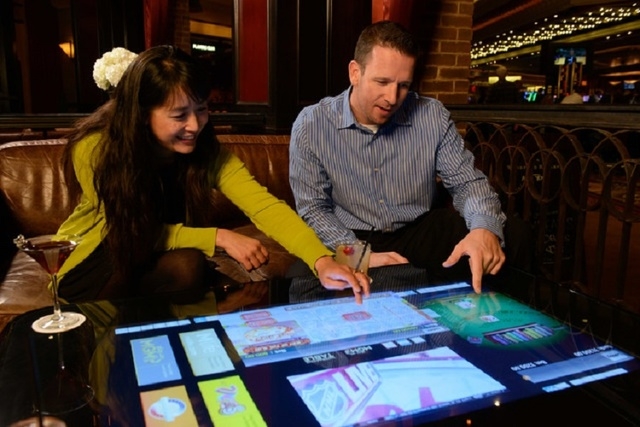At MGM Resorts properties, customers give gaming’s future a spin

Tables resembling giant smartphones have grown so popular inside The Mirage, Bellagio and MGM Grand that content providers are clamoring to put their free-to-play gambling products on the devices.
Recently, Reno-based Spin Games added its slot machine, video poker and bingo games to the tables, which already offer blackjack and slot machine titles provided by the myVegas social casino application.
MGM Resorts International views the tables — which were manufactured by an Australian company — as a way for its customers to test-drive gaming’s future.
However, it may be a year before real money can be wagered on the multiplayer tables.
“This is one more step in our strategic initiatives that will revolutionize how Generation X and Y experience our properties,” said Tom Mikulich, MGM Resorts’ senior vice president of business development. “Our ultimate goal is to convert the ‘free to play’ games to ‘real money games’ in early 2016.”
Mikulich wouldn’t be surprised to see tables, or a variation of them, eventually find a home on the slot machine floor.
Last week, Nevada’s gaming regulators took the initial steps in developing rules designed to save the state’s slot machine industry. The new regulations could make Mikulich’s prediction come true.
Fueled by the passage of Senate Bill 9, the Gaming Control Board — with input from gaming equipment manufacturers and interested parties — began developing the language governing “skill-based gaming,” which would add arcade-style video components to the traditional slot machine.
Imagine “Space Invaders” meets “Wild Cherry.”
Control Board Chairman A.G. Burnett figures the regulation drafting will take a multiple steps. But the working elements, which marry games of skill with games of chance, are sorely needed for a product that could become obsolete unless it starts attracting a younger demographic.
“Can the one-armed bandit reinvent itself?” Deutsche Bank gaming analyst Andrew Zarnett rhetorically asked the investment community in a research report this month. “There is no doubt that gaming, specifically the slot machine, needs a face-lift.”
That makeover is supported by the Association of Gaming Equipment Manufacturers, which backed the bill. The measure, signed by Gov. Brian Sandoval, allows for “hybrid games,” where a combination of chance and a player’s skill determines the outcome of a jackpot.
In the past few years, the casino industry has targeted millennial customers — young adults born in the 1980s and 1990s — by offering entertainment amenities (nightclubs), dining (trendy restaurants), and edgy retail (tattoo parlors and brand-name clothing designers).
Where the casino operators have fallen short is in gaming.
“(Casinos) have failed to get millennials to spend their dollars on slot play, in any meaningful way,” Zarnett said.
Data from the Las Vegas Convention and Visitors Authority show baby boomers represent 35 percent of Strip visitors. Millennials account for 25 percent and growing. Zarnett expects millennial visitation to surpass baby boomers visitation by 2020.
Skill-based slot machines could be a key attraction to ensure millennials gravitate toward casinos.
“Players will now have the opportunity to be part of the game, improve their odds and thus ultimately lengthen play time,” Zarnett said.
Millennials have become acclimated to playing games for free on mobile devices, including social casinos. The market was $2.8 billion revenue business in 2014, Eilers Research reports. Players often spend nominal fees to acquire virtual gaming chips, such as 99 cents for thousands of tokens.
The trick is to convert those free play customers into real money gamblers. That’s where skill-based slot machines and the tables inside MGM properties come into play.
Besides offering social games, the 42-inch screens let customers watch television, access social media and check on their fantasy sports teams. The tables also serve as a “virtual concierge” that customers can use to buy show tickets or make restaurant reservations through their MGM player loyalty program.
For now, they tables been located in high-customer traffic areas not traditionally associated with gambling, such as lounges, nightclubs, dayclubs and bars. One popular table at The Mirage is inside the Roasted Bean coffee bar.
Zarnett believes skill-based game integration could be the spark to jump-start a slot machine replacement cycle “which has been a stupor for many years.” The last big movement to switch out older slot machines with newer models came more than 10 years ago, when ticket in-ticket out cashless gaming was introduced.
So far this year, the biggest slot machine supplier news came a week ago. International Game Technology said it placing 400 games at Penn National Gaming’s Plainridge Park in Massachusetts while Scientific Games Corp. sold 2,000 slot machinelike video lottery terminals to the Oregon Lottery.
New Jersey and several American Indian tribes have experimented with skill-based slot machines. Zarnett said Nevada’s entry was critical because it gives manufacturers a potentially large market.
“Since the Great Recession began in 2008, the supplier space has faced declining demand year after year,” Zarnett said. “For gaming operators to achieve improved revenue growth, they need to attract more patronage and play from the millennial generation.”
Skill-based games and tables like the ones at MGM properties are a start.
Howard Stutz’s Inside Gaming column appears Wednesdays and Sundays. He can be reached at hstutz@reviewjournal.com or 702-477-3871. Find on Twitter: @howardstutz.